Our festival
What's ISLA?
Isla de Salsa, World Beat Festival is an annual event organized by the NPO Tiempo Iberoamericano since its founding in 1997. It has become the largest Caribbean-themed festival in Japan and the most enduring international cultural event in the city of Fukuoka, celebrating its 26th edition this year.
The festival offers a unique gathering in the bay of Fukuoka, surrounded by nature and just a 10-minute boat ride from the city center.
Drawing on the deeper meaning of the word salsa, this event is not limited to a single music genre—it celebrates the blending of elements, cultural integration, and mutual understanding. Salsa here stands as a symbol of fusion, collective richness, and the creation of something new through human connection.
“Isla de Salsa” was born to represent cultural diversity and to echo the creative potential that arises from encounters between different cultural identities.
At a time when society is leaning toward individualism and digital disconnection, this festival reaffirms the value of real, human communication. It promotes a way of living together that transcends artificial divisions—whether by origin, gender, nationality, age, or religion.
Over the years, legendary Caribbean artists such as El Gran Combo, Los Van Van, and Habana de Primera have graced its stage. It was also here that Juan Luis Guerra made his debut in Asia, leading to the creation of his famous song, “Una Bachata en Fukuoka.”
While our special guest often comes from the Caribbean, the spirit of this WORLD BEAT festival invites the whole world—breaking down all borders—to celebrate life through music, dance, and human connection.
This year, we are expanding our perspective even further by incorporating influences from festivals around the globe, offering an experience with a truly unique flavor.
Don’t miss it!
"World Beat Matsuri"
In Japan, there is an ancient belief that gods dwell in all things in nature — a worldview known as Yaoyorozu no Kami (“eight million gods”).
Matsuri (Japanese festivals) are not simply entertainment; they are moments to give thanks to nature and the gods, to share hopes and joys.They are acts that help nurture and enrich the community.
We chose the Japanese word Matsuri as a subtitle because we feel a deep connection with the spirit of Japanese festivals.
We hope that Isla de Salsa becomes a place where people and cultures connect — and where something new can be born.
Do you remember?
ISLA Highlight
For 25 years, we have enjoyed "salsa" made from many cross-cultural exchanges.
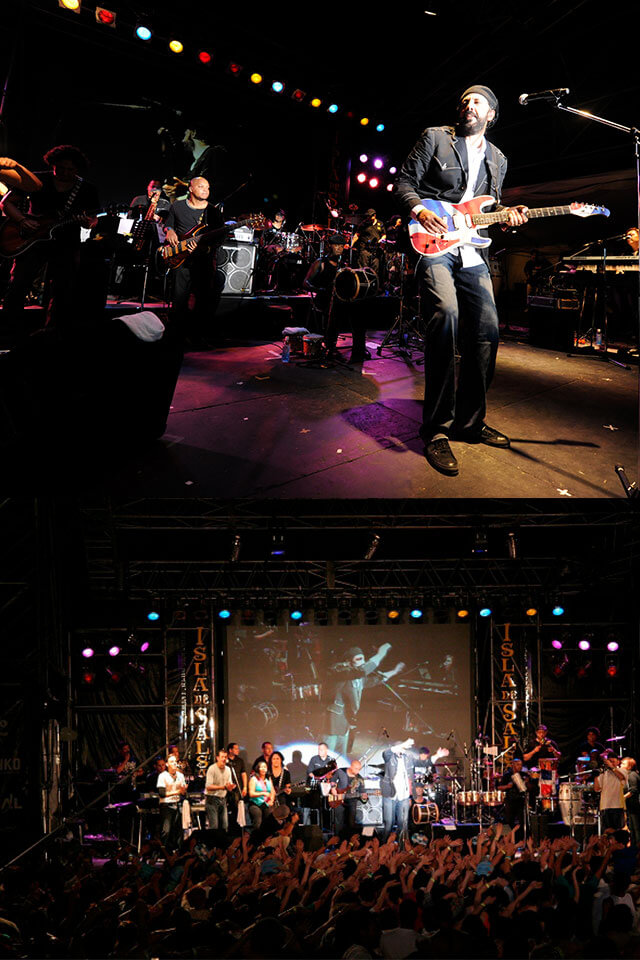
Juan Luis Guerra
ISLA DE SALSA 2009
The only king of Bachata Juan Luis Guerra made his debut in Asia.
Bachata en Fukuoka
JUAN LUIS GUERRA
"Bachata en Fukuoka", which Juan Luis Guerra composed describing the memories of Fukuoka, won the Latin Grammy Award for Best Tropical Song.
Sukiyaki Song by CALLE REAL
ISLA DE SALSA 2011
CALLE REAL dedicated the world-renowned Japanese song "Sukiyaki Song" together with singer-songwriter Isamu Shimoji to the victims of the Great East Japan Earthquake. This act of solidarity was one of the most exciting moments in the history of ISLA.
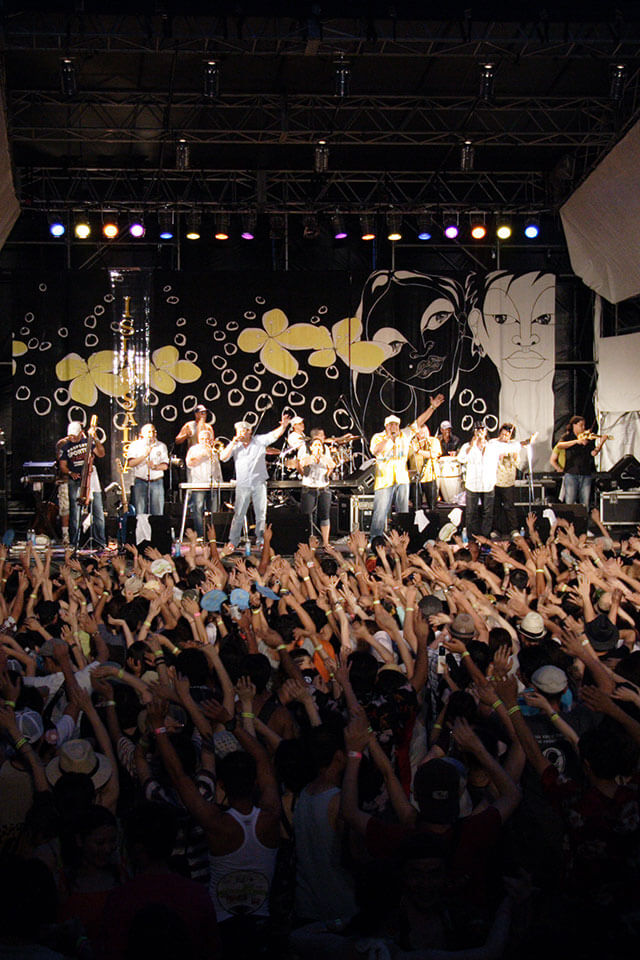
Los Van Van
ISLA DE SALSA 2011
In 2010, "¡Vívela Japón! Salsa Tour" expanded to Asia Pacific, bringing the legendary Cuban salsa orchestra "Los Van Van" to three Australian cities, including the Sydney Opera House.
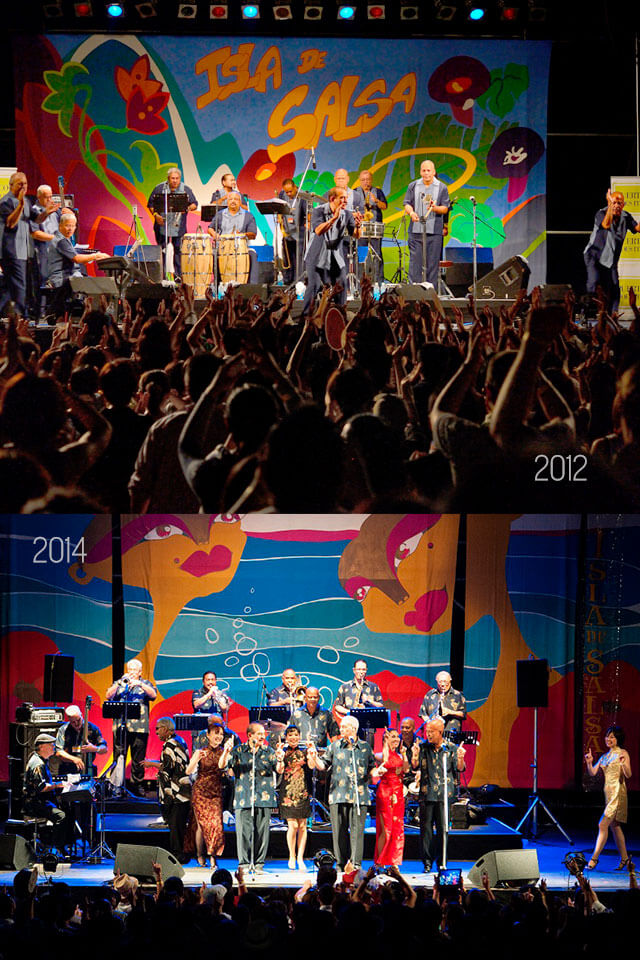
EL GRAN COMBO
ISLA DE SALSA 2012
Isla de Salsa was one of the historical stages of the world tour of 50 concerts around the world commemorating the 50th anniversary of the legendary classical salsa orchestra "El Grand Combo".
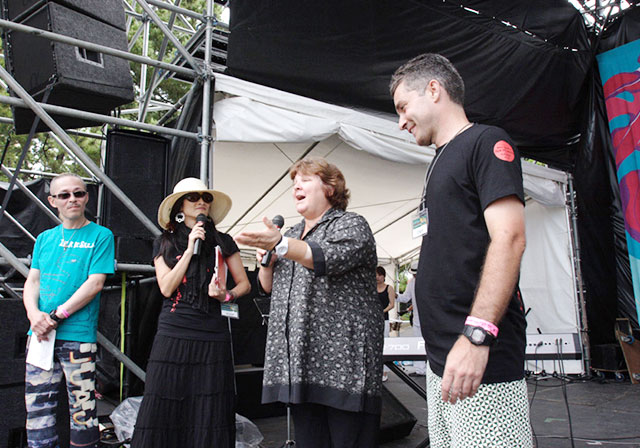
Aleida Guevara
ISLA DE SALSA 2011
Aleida Guevara (Che Guevara's eldest daughter), who visited Japan to attend the Peace Memorial Ceremony in Hiroshima and Nagasaki, was present at Isla de Salsa.
14 years trajectory
ISLA DE SALSA 2011
A video created to commemorate the 15th anniversary of Isla, remembering the festivals for 14 years.
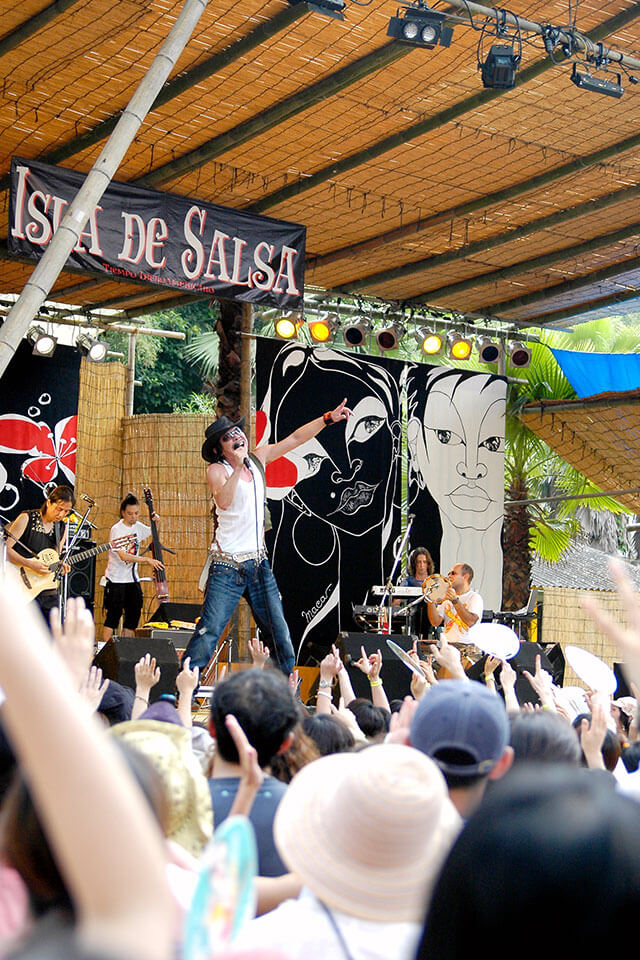
GANGA ZUMBA
ISLA DE SALSA 2004
Kazufumi Miyazawa, the vocalist of THE BOOM and the top-tier Japanese artist in Japan, unleashed the euphoria of fans.
Isla de Salsa 2025
Important Notes
Please read the following information before participating in the "ISLA DE SALSA" festival, it will be much more fun!
There is no parking available for festival visitors on Nokonoshima.
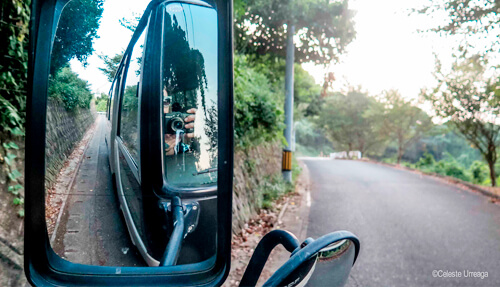
There is no parking on Nokonoshima for festival visitors.
Free transport “Shuttle Bus” is available between the Port and the Festival during the festival. You need to show your ticket to board buses.
If you come by car, please use the paid parking lots around Meinohama Ferry Terminal before boarding the ferry.
Parking on the streets in Nokonoshima is prohibited to avoid any annoyance for the residents of Nokonoshima and also to not inhibit bus service on the very narrow roads.
Drinks and foods are not allowed into the festival venue.
Please note that all baggages will be inspected at entrance gate. Thanks in advance for your understanding and cooperation.
No drinks allowed: NO BEVERAGES of any kind (except milk for infants) can be taken in to the festival venue. Bags will be checked at the entrance and any beverages found will be collected. As you leave the festival, your beverages will be returned to you. We ask for your cooperation and appreciate your understanding.
Foods: brought from outside of the festival are not permitted.
Recording or filming the performers is prohibited.
Smartphones, mobile phones and cameras are allowed to enter the festival venue. However, it is strictly forbidden to photograph, film and record the artists without the authorization of the organizer. Likewise, it is prohibited to take shots with a tripod or commercial shots. Should any of these violations be found, the data will be deleted immediately on the spot. Please note that if you do not follow the instructions of the staff, your photography equipment may be confiscated or you may be asked to leave the venue.
Don't Drink and Drive
We don't sell any alcohol to drivers, nor to people who are underage.
Each person must be responsible for moderating their alcohol consumption. Please note that the effects of alcohol are stronger in the sun. If you find someone feeling ill or intoxicated, please notify the staff or security.
For smokers
Out of consideration for children and the environment, please use the designated smoking area when you wish to smoke.
Beach parasols, mats, camping tents, other items for outdoor activities.

The area in front of the stage is designated for dancing, so it is prohibited to place or use any tripods, chairs, beach seats, etc. within that area. Please place or use your beach seat at the beachside.
Help us separate the trash.
we would like to carry out various initiatives on the theme of ecology at the festival as global warming becomes a problem.
Be sure to separate your trash and dispose of it in the designated bins. Thanks for your cooperation.
To enjoy beach festival
- Please bring sun umbrellas, towels or any other items which will help to protect you from sunstroke.
- As there are mosquitos near the water and in the green areas of the festival venue, please come prepared with mosquito repellant.
- We kindly ask you to take responsibility for your own belongings. Valuables must be stored in the coin lockers (paid). Other items can be left at the cloakroom (Bungalow C-1) or in the coin lockers inside the venue. Please note that valuables cannot be stored in the cloakroom.
Others
- Please be careful that your "Isla de Salsa" bracelet does not break. People who are not wearing a "Isla de Salsa" bracelet will be asked to choose to either pay the ticket price or to leave the festival.
- Do not enter the dressing rooms or mount the stage.
- If People come without ticket, we will call the police and transfer the issue to them. After that, we will demand for compensation.
- We bear no responsibility for any trouble or any accidents either inside or outside of the festival venue.
- People who cause a nuisance to other attendees, staff or musicians may be asked to leave the festival, after warning from staff or security. In such instances, we will not refund the ticket fee.
- We don't have any responsibility for any problems, accidents, or robbery. Furthermore, we bear no responsibility towards the resolution of any such problems.
- Please note that photos and videos will be taken throughout the concert for promotional purposes, and may be posted on social media by the organizer. Please contact the organizer if there is a problem with the published images.
FAQ
Frequently Asked Questions
There is no parking available for festival visitors on Nokonoshima.
There is NO PUBLIC PARKING available for festival visitors in Nokonoshima.
We strongly advise to take public transportation to Meinohama ferry terminal. You can take a Nishitetsu bus from Hakata and Tenjin.
If you come by car, please use the paid parking lots around Meinohama Ferry Terminal before boarding the ferry.
Please refer to the Access page for more information.
** Visitors who are using Island Park, accommodations on the island, or entering Nokonoshima by car for purposes other than the festival must confirm in advance where they will park on the island before boarding the ferry.
Temporary luggage storage (surcharge applies) is available at the venue during the festival. You can use it anytime you need.
We will not take any responsibility regarding the loss or theft, so please use the storage units. Please note, we will not store any of your valuables.
Luggage storage:
You can use it anytime you need.
We will not take any responsibility regarding the loss or theft, so please use the storage units. Please note, we will not store any of your valuables.
* Bungalow C-1
* Available from 12:00 to 20:30.
* Fee: 500 yen
Coin lockers:
Coin lockers can be found at the sea house "Umi-no-ie".
* Charge: 200 yen
* Use these lockers for valuables.
Changing room can be found in the back if you go through the center passage in the sea house.
Also, it is used for a changing room if any shower room is a vacancy.
Hot showers can be found next to the sea house office and BBQ area.
** Charge: 200 yen per 3 mins.
If any shower room is a vacancy, it can be used for a changing room. The entrance will be BBQ area side.

Food and drinks are served at the food stand Café Restaurant SANCHO PANZA and Umi no Ie.

Please note that you cannot bring food or drinks into the venue, so we appreciate your collaboration.
YES, we will open some bungalows in front of the Beat Stage for your rest and there will be many tents where you can also protect yourself. Please feel free to use this areas.
Upon entering the venue on the day of the event, you will be given a wristband in exchange for your ticket. If you show your wristband to the staff at the entrance, re-entry is possible.
Please note that the bracelet removed from the wrist will not be valid.

The last ferry departure time will be 22:45 on Saturday.
The festival will end with enough time to take the last ferry. There will be extra bus and ferry for the people who wish to take the ferry at the time of the last ferry, so have fun the festival until the end without worries.
(The extra ferry service will operate only in the case of purchasing the ticket before the departure time of the last ferry and if the people waiting exceed the ferry capacity). If you get to Nokonoshima ferry port after the departure time, please be aware that it would be unavailable to take the extra ferry )
Also, the water taxi will be available from Nokonoshima Camp Ground to Meinohama.
Please refer to the Access page for more information.
Yes, we will offer you bungalows in the venue.

In addition, at Nokonoshima Island Park, located 1.4 km from the festival site, there are 10 cottages overlooking Hakata Bay.

If you prefer to stay in a hotel, there are some hotels and Japanese Inns on the island and in Meinohama area.

Reservations are accepted to sleep in a tent. A space is 2.5m × 2.5m.
For more information, read the accommodation page.
It is strictly prohibited to camp in places other than those specified by the organizer and to spend the night without a prior reservation.
Smartphones, mobile phones and cameras are allowed to enter the festival venue. However, it is strictly forbidden to photograph, film and record the artists without the authorization of the organizer.
Likewise, it is prohibited to take shots with a tripod or commercial shots. Should any of these violations be found, the data will be deleted immediately on the spot. Please note that if you do not follow the instructions of the staff, your photography equipment may be confiscated or you may be asked to leave the venue.
Any other question, please contact us!
092-762-4100
Contact Form